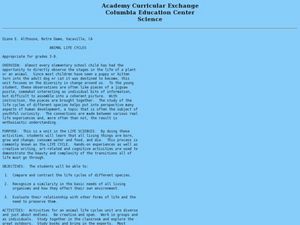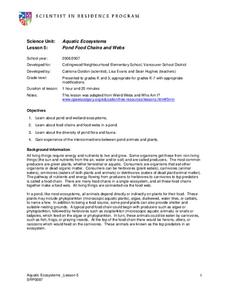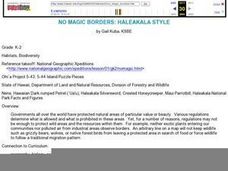Curated OER
Classy
Students explore the classification system in this seven lessons unit. The diversity of life forms and their characteristics are examined using a microscope. Kingdoms, classes, and families are investigated.
Curated OER
Desert Views - First Impressions: Travelers on the Gila Trail
Students draw animals and plants that are described to them as they read passages of people who traveled across the Gila Trail in the Southwest. In this Gila Trail lesson plan, students also write a letter describing a plant or animal in...
Curated OER
How Can Clear of Tress Destroy a Community?
Fifth graders brainstorm the relationship between trees and humans to determine how humans benefit from trees and how they benefit from us. They discuss oxygen/carbon dioxide exchange, soil stablization, animal habitat, shade, medicine...
Curated OER
Structure and Function of the Cell/Introduction to the Cell
So, this is not technically a worksheet, but rather a chapter of reading material, pictures, and diagrams introducing young biologists to the cell. Cell theory, diversity, size, and shape are described. The internal organization and...
Biology Junction
Protists: The World of Protists
More than 200,000 species of protists exist, living on land and in water around the planet. Scholars view the diversity of protists in an interesting presentation. It divides protists into three groups: animal-like protists, plant-like...
Curated OER
Rx Rainforest:
Students identify plant diversity in the rainforest and the role that animals and habitats play in scientific research. They differentiate between natural habitat and laboratory research and work collaboratively to produce a video news...
Curated OER
Animal Life Cycle
Students conduct hands-on experiments. In this life cycle lesson, students are able to observe a variety of animals as they travel through their life cycle (brine shrimp, mealworms, frog eggs and chicken eggs). Students respond to what...
Curated OER
Natural Inquirer
Students interview wildlife experts to gain information needed to research and write a report about an aquatic plant or animal affected by climate change.
Curated OER
Finding Fungi in the World Around Us
These lesson ideas will help your students explore the diversity of Kingdom Fungi.
Curated OER
Biodiversity in an Estuary
Learners investigate the biodiversity in estuaries. In this estuary lesson plan, students use Google Earth to explore the Rookery Bay National Estuarine Research Reserve. They produce a biodiversity concept map and portray the life of a...
Curated OER
Going...going...gone? Tropical Rainforests-How They Work, What They Do for Us, What's Being Done to Them...
Sixth graders explore the Tropical Rainforest and come to understand what it is and how it affects the ecosystem. In this rainforests lesson, 6th graders write about the Tropical Rainforest, imagine they are in the Tropical Rainforest,...
Serendip
Structure and Function of Cells, Organs and Organ Systems
Cells of different organs have unique cell functions. Learn how cell functions vary depending on their roles in the body using an inquiry-based activity. Scholars analyze the cell structure to make comparisons to its functions, allowing...
Curated OER
Creating a Pollinator Garden
Students build a pollination garden. In this pollination lesson, students read directions and build a pollinator garden that will produce flowering plants for pollinator organisms to use in pollination of other plants.
Curated OER
Aquatic Ecosystems
Students study ponds and wetland ecosystems and examine the food chains and webs in them. In this aquatic ecosystems lesson students answer questions about the diversity of the flora and fauna in a pond.
Curated OER
Insects!
Students explore the diet of insects. In this "insects" biology lesson plan, students take a nature walk and collect various natural materials they think may be eaten by insects. Students sort and classify these materials into three diet...
Curated OER
Discovering the Forgotten Kingdom Protista
Protists, like algae and mold, are sometimes overlooked for classroom study, but they are astonishing in their diversity and importance.
Curated OER
Rainforest Relationships
Students provided with opportunities to explore the animals and plant life that coexist in the various layers of the tropical rainforest. They appreciate the diversity of life in each layer. Students write a report on a particular plant,...
Curated OER
Nature Superfish
Students study the behavior or ocean animals called billfish. In this life science lesson, students create their own documentary about a local animal. They share their videos with the entire school.
Curated OER
No Magic Borders: Haleakala Style
Students discuss borders and boundaries. They discuss pollution and the fact that boundaries cannot stop pollution and that pollution affects even protected wildlife and plants. They participate in an activity in which they must place...
Curated OER
Habitats and Deep Sea Environments
Students examine and identify the characteristics of the four zones of the ocean. They discover the amount of diversity in marine habitats. They also explore the adaptations organisms have that have allowed them to survive.
Curated OER
Rain Reasons
Students explore how climatic factors influence the growth of plants. They create an experiment to find how variations in water, light, and temperature affect plant growth and describe how precipitation and geography can affect the...
Curated OER
Title: Biodiversity Analysis and Comparison Within the New Jersey Highlands
Students explore the concept of biodiversity. In this environmental science lesson, students use field methods to examine the trophic relationship that allows for species diversity.
Curated OER
Locating Echo
Students read the book The Adventure of Echo the Bat. In this animal science lesson plan, students read the book and create a chart labeled "Land Feature," "Habitat," and "Food." Students fill in the table according to where the...
Alabama Learning Exchange
It's a Small, Small World
Students compare and contrast the different characteristics of animal-like, plant-like, and fungus-like protists. They list examples and describe the characteristics shared by the three protist groups. They create a brochure or slideshow...

























